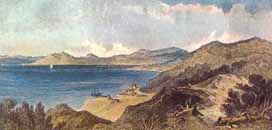 | Twelve months in Wellington / by John Wood (1843)
Introduction |
| Contents: preface | introduction | narrative | chapters: 1 | 2 | 3 | 4 | 5 | 6 | 7 | 8 | 9 | |
WITH New Zealand we have been partially disappointed; by the New Zealand Company not a little deceived. The object of this little work is to call attention to the acts of the one, and to make known a few facts illustrative of the present condition of the other.
The shareholders and Directors of the above Company comprise as upright and high principled a body of men as any association in the land ; but they have, unfortunately, been led by designing individuals, who have counteracted the extended usefulness of the Company, and made it a stepping-stone to their own aggrandizement. Their glowing one-sided representations of the "Land of Promise", induced respectable families to forego the substantial comforts of a home for the dream of independence abroad. Many who relinquished a moderate competency in England are now suing for charity among strangers in New South Wales. Numbers have returned to Great Britain, and nearly all the settlers at Port Nicholson, unconnected with Government and the Company, would also return, could they but realize what they have sunk, and obtain funds to defray their passage home. Nobles, honourables, M.P.'s, and esquires, have all sanctioned by their names, and, under the gaudy banner of pseudo philanthropy, have been parties in sending emigrants to New Zealand. Ship them off! ship them off! is the cry, careless of what fate awaits the emigrant on reaching his destination. The New Zealand Company must, or should know, that the islands to which they are sending them yield spontaneously no edible production but the fern root : that hitherto Her Majesty's Commissioner has not decided on the Companyâs claim to the territory which they profess to have purchased of the natives - a purchase the natives themselves deny : that Port Nicholson is girded by nearly impassable mountains : that the land thus sold is, for the most part, owned by absentees, and that, consequently, there is no adequate provision for the employment of the poor sent out : that they have made no provision for the making of roads, the construction of bridges, and for other public works, for want of which it is impossible that colonization can succeed : that the Company, in their first appeal to the public, promised employment to labourers at the rate of a guinea a-week, with rations ; but now, when this inducement has clone its work of persuasion, they refuse to abide by their contract - that the last of the town lands comprised in their first and principal settlement was not open for selection before the beginning of this Tear, and, consequently, no emigrants should have been sent out before January last. These are matters of which the Company must be cognizant, and yet they continue to cry, buy!, buy!, buy! - their sole object, disguise it as they will, being a sordid, money-jobbing, speculation. Ten per cent blinds the shareholders, and needy men are provided for. When public feeling wanes, fetes and "honourable company" are resorted to. The Directors grumble and it is forthwith pro-posed that £1,500 a year be set apart for compensation money for attending to the affairs of the body, and thus do matters at the New Zealand House wag merrily as a marriage-bell. We have suffered grievously from such conduct, and fervent is our hope that the British Government will grant no more diplomas for Joint Stock Companies to practice "act libitum" in the wide and fertile field of colonial colonization. Of the islands of New Zealand we shall say little. Our experience is confined to the Company's first and principal settlement at Port Nicholson, and our object has been to describe that settlement as it is. To others we leave the task of prophesying what it may hereafter become, and shall conclude with a remark attributed to the Lord Bishop of that new diocese, viz., that "five hundred years hence New Zealand will be a great country; but in the meanwhile there is certainly very much to overcome."
